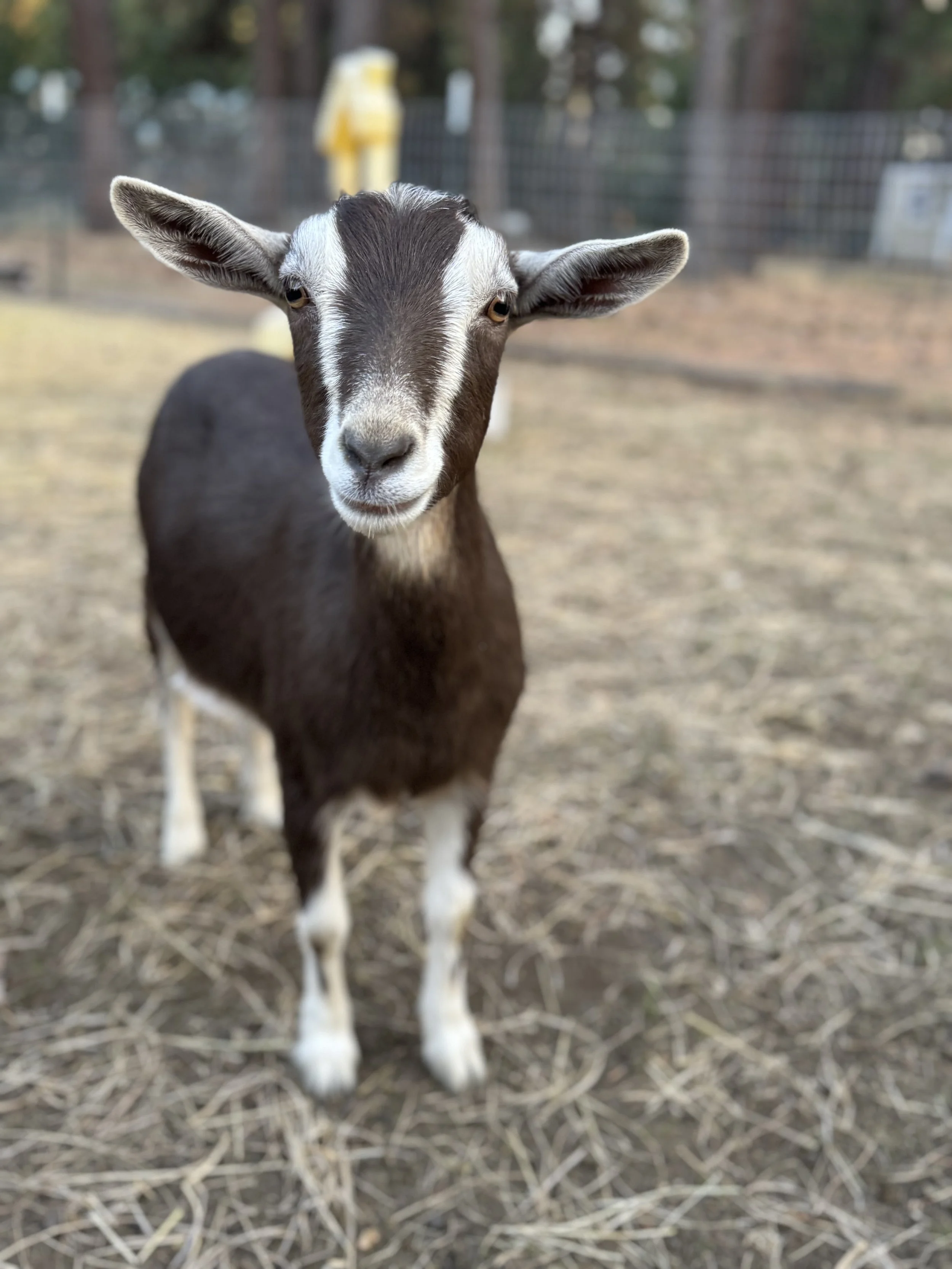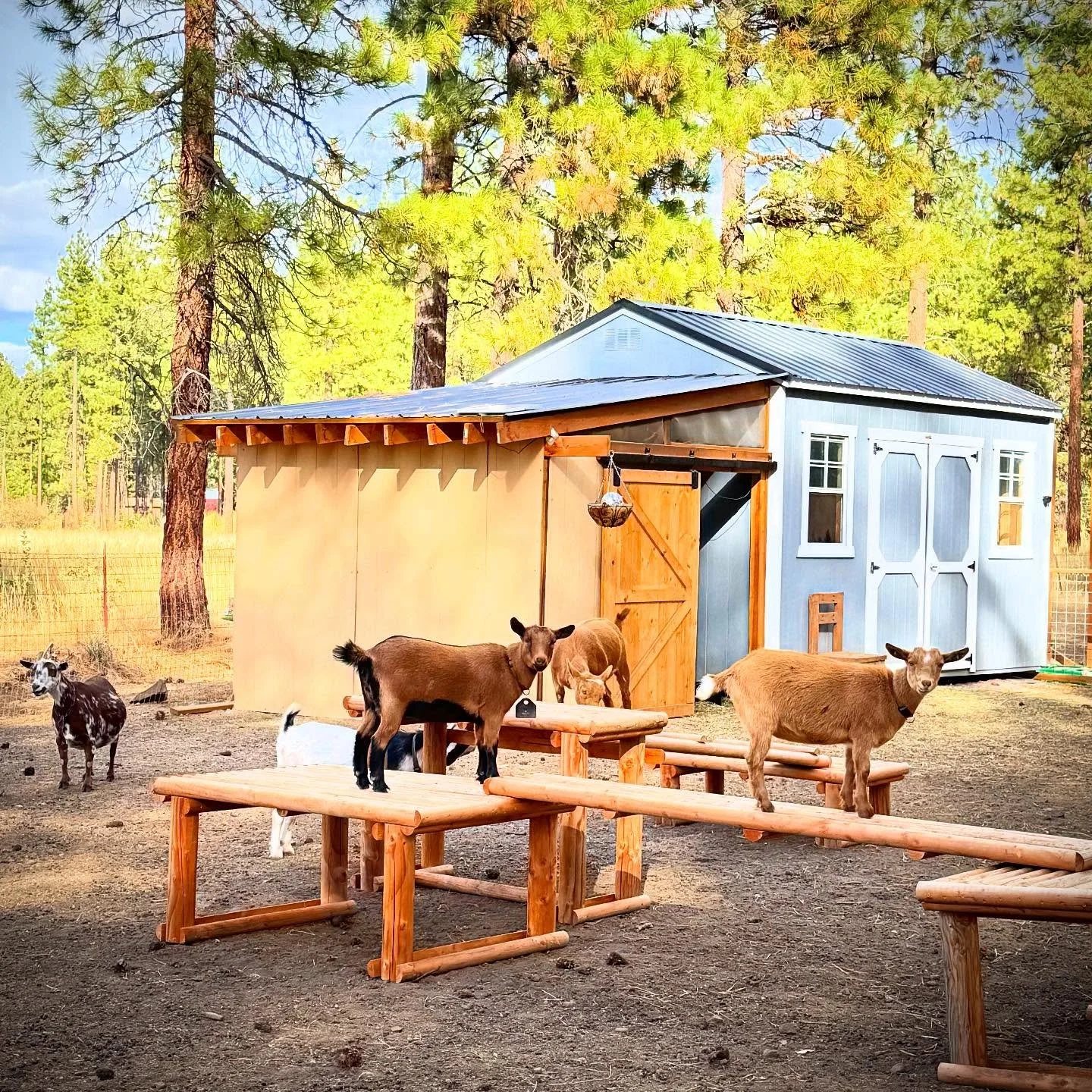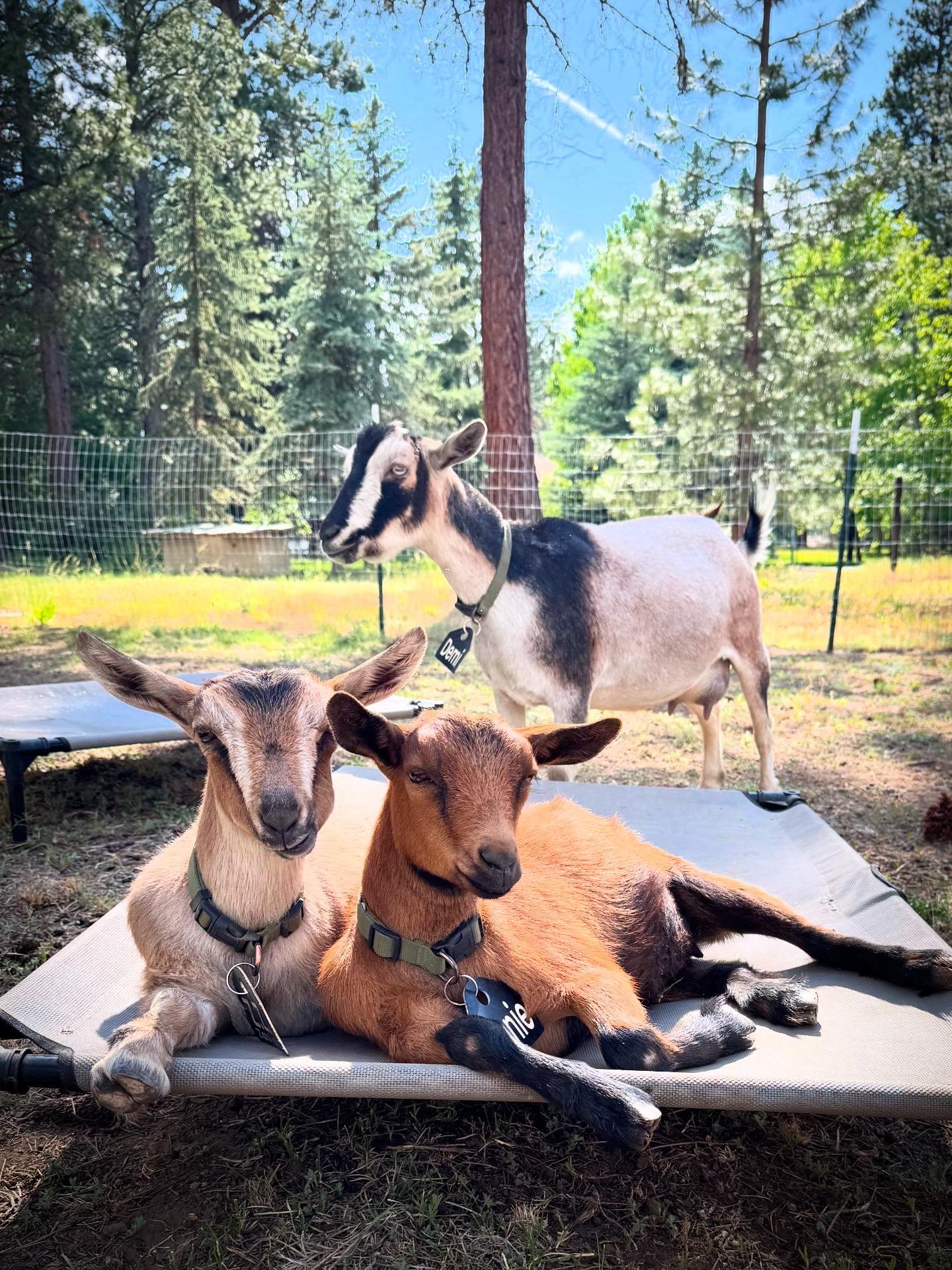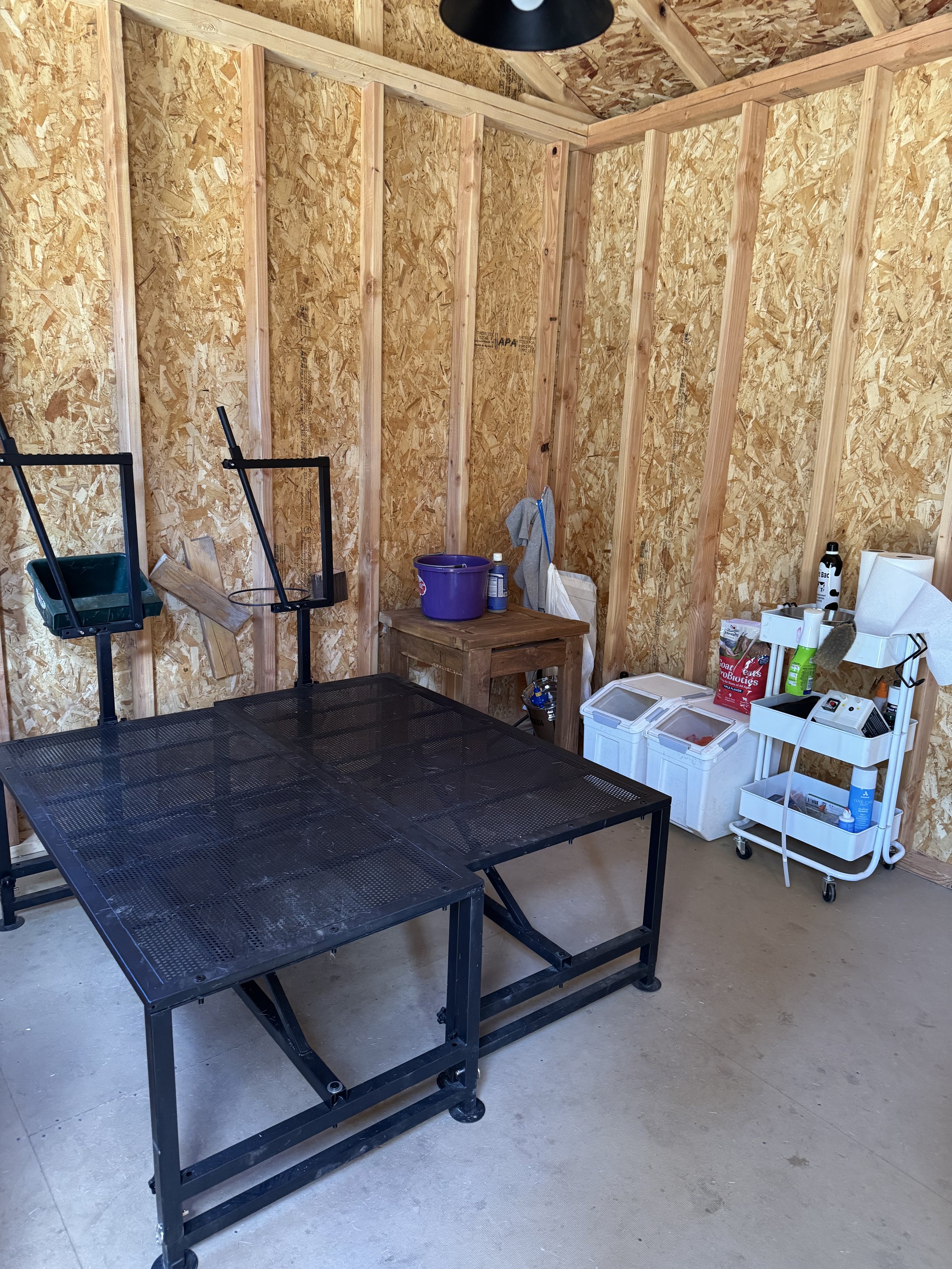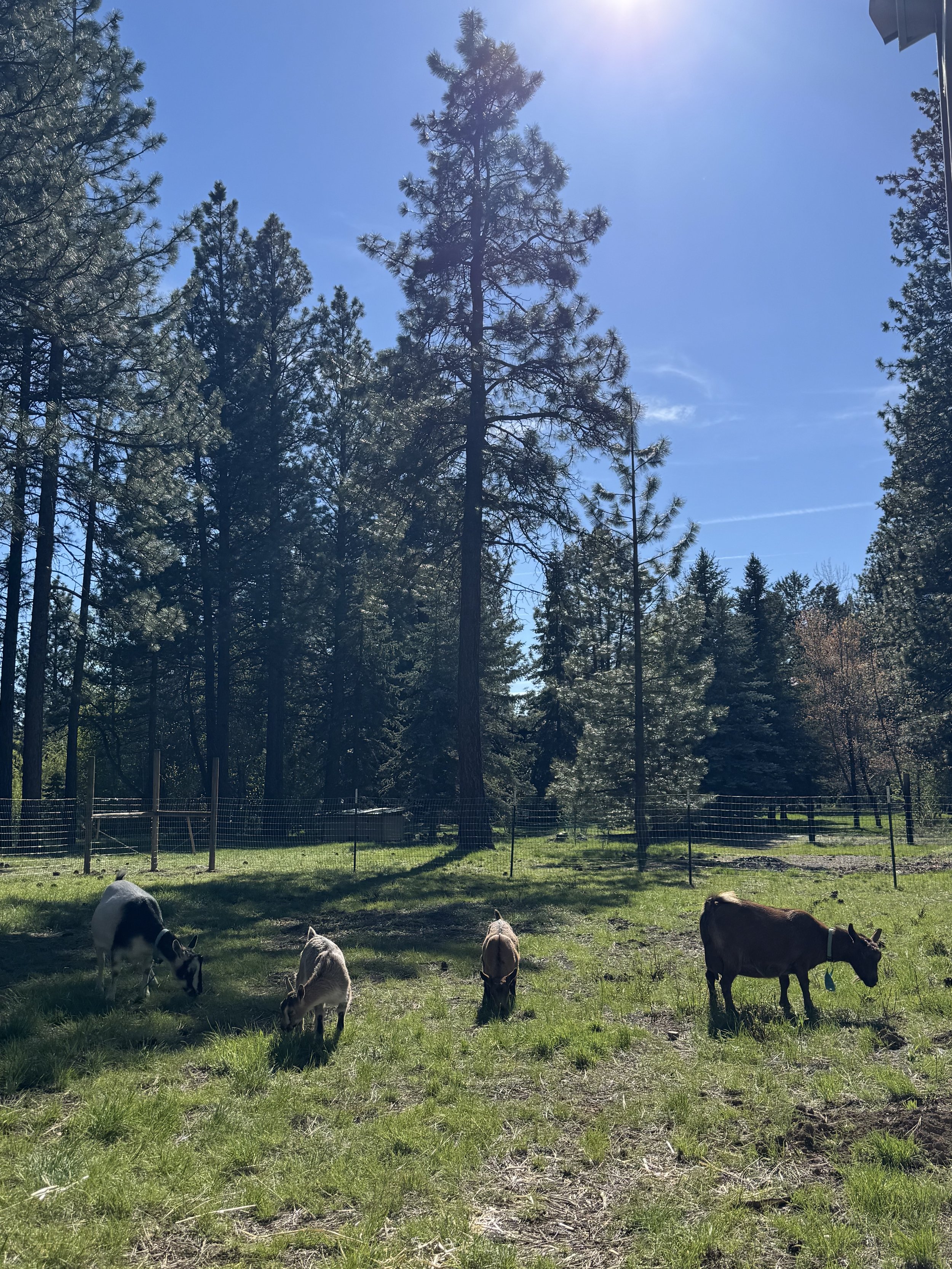Getting Ready For Our First Goats: What We're Buying
Welcoming goats onto our homestead was an exciting endeavor that required thorough preparation. To ensure the health and happiness of our new herd, it was important that we had all the necessary supplies ready before their arrival.
This guide provides a comprehensive list of everything we have purchased to meet the needs of caring for our goats, from housing to healthcare and kidding essentials. Everything in bold is what we recommend to be purchased before any goats are on-site. We hope this list helps you create your herd when the time comes!
All underlined text is linked directly to the product we recommend. Click here to see our Amazon list (which does not include all necessary supplies!) in one location.
Nutrition and Feeding Equipment
Hay Feeders: These feeders help distribute feed evenly and can be easily moved for rotational grazing.
Mineral and Baking Soda "Feeders": We plan to use these to house our minerals and baking soda.
Goat Minerals: Ensure your goats receive all necessary vitamins and minerals. A good mineral is a MUST. We recommend Purina’s goat mineral or Sweetlix Meat Maker Goat Mineral (even for dairy goats). The sweetlix is the best.
Baking Soda: Ensure you have baking soda available to your goats when they need it for self-serve, to soothe an upset stomach, or to balance their rumen.
Alfalfa Hay: Provide plenty of hay to aid digestion and keep your goats healthy. (Female goats only). DO NOT FEED MALE GOATS ALFALFA! It contains too much calcium for males and will cause urinary stones.
Orchard Grass Hay: I recommend it for kids, wethers, and bucks. I mix 20% into my alfalfa for my does.
Barley or Goat Feed: We use whole raw barley that has been sprouted in mason jars for 2-3 days as our feed for milking does. Invest in high-quality feed that is specifically formulated for goats. (Only for pregnant and lactating goats, I will not feed my goats "feed" any other time).
Black Oil Sunflower Seeds: We feed to our milking does while they’re on the milking stand.
Haystack Naturals Rabbit 16% Alfalfa Pellets: We feed to our milking does while they’re on the milking stand.
Feed Storage Bins: Keep your feed dry and protected from pests.
Health, Hygiene, and Emergency Medical Supplies
Goat Hoof Tools and Trimmers: Regular hoof care is essential to prevent foot ailments.
Digital Thermometer: A quick and accurate way to check a goat’s temperature. Always have a dedicated animal thermometer.
Drench Nozzle: Used to give medication orally.
3cc Syringes with needles: Used for larger doses of injectionable medication.
1cc Syringes with needles: Used for kids and smaller injectionable medication doses.
Veterinary Stethoscope: This is essential for listening to heart and lung sounds, which is crucial for diagnosing conditions like pneumonia or monitoring heart health.
Precision Tweezers: Useful for removing foreign objects such as thorns or splinters from a goat's skin.
Medical Scissors: Used for cutting bandages or trimming hair around a wound. Ensure they're sharp and made of stainless steel for durability and hygiene.
Latex or Nitrile Gloves: To maintain hygiene and protect both the caregiver and the goat during treatment.
Cotton Balls and Swabs: Useful for applying medications or antiseptics to small areas.
Self-adhesive Bandages: These bandages stick to themselves but not to fur, making them ideal for securing dressings without causing discomfort when removed.
Gauze Pads: Useful for covering wounds to absorb fluids and protect from dirt and bacteria.
Vet Wrap: Flexible and water-resistant, vet wrap helps secure bandages in place and provides support and protection for injuries.
Vetericyn Plus Antimicrobial Wound Care Healing Aid + Skin Repair for Animals
Iodine Solution: Used for disinfecting wounds, iodine solution is a staple for cleaning cuts or abrasions before bandaging.
Chlorhexidine Solution: This antiseptic is an alternative to iodine. It is effective against a variety of pathogens and is less irritating to skin and wounds. It also works great as a sanitizer for milking equipment.
Hydrogen Peroxide: Useful for cleaning wounds initially, but should be used sparingly as it can damage new tissue.
Vitamin B Complex: This is crucial for goats, especially in times of stress, illness, or recovery. Vitamin B complex helps improve appetite, energy levels, and proper digestion. It is particularly important for goats recovering from illnesses or for pregnant and lactating does, as it supports overall health and vitality. The choice between oral and injectable forms usually depends on the specific health condition being treated, the speed at which treatment is required, and ease of administration. For routine supplementation, oral solutions are generally preferred, but for acute care, injectables are more effective. Always consult with a veterinarian to determine the best form and dosage for your goats' health needs.
Goat Blue Light Electrolytes: Electrolytes are essential, especially when goats are dehydrated or suffering from diarrhea. They help maintain fluid balance, support healthy nerve and muscle function, and can quickly restore vital minerals and hydration lost during heat stress or sickness.
Activated Charcoal: Helps with tummy aches caused by eating something they shouldn’t have…
Ultra Boss: Pour-On: To treat lice
Diatomaceous Earth (Food Grade): To prevent lice and other mites.
Microscope and Fecal Testing Kit: Perform on-site health diagnostics to manage parasites effectively.
Baycox: Baycox Piglet Coccidiocide, containing 50 g/L toltrazuril, is formulated to control coccidiosis in piglets and cattle. While not specifically labeled for goats, some veterinarians may prescribe it off-label for treating coccidiosis in goat kids. It’s crucial to consult with a veterinarian before using Baycox in goats to ensure proper dosage and safety. This product is available from Australian suppliers.
Fenbendazole (Safeguard or Panacur): Effective against a broad spectrum of gastrointestinal parasites, including stomach worms. Fenbendazole is often chosen for treating pregnant does as it is considered safe during pregnancy. Available as a liquid or granules that can be mixed with feed.
Valbazen: Broad-spectrum dewormer effective against tapeworms, liver flukes, and lungworms, in addition to the usual gastrointestinal worms.
Cydectin: Effective against a broad range of internal and external parasites, including those that are resistant to other dewormers. Pour-on, injectable, and oral drench forms.
Clostridium Perfringens Types C&D Antitoxin: critical for immediately neutralizing toxins from overeating disease, especially during high-risk periods like purchasing new goats, breeding, kidding, or dietary changes, ensuring rapid response to prevent fatal outcomes.
CD&T Vaccine: The CD&T vaccine is essential for preventing clostridial diseases in goats, especially enterotoxemia (overeating disease) and tetanus, both of which can be fatal. It’s a core vaccine recommended for all goats, with booster schedules starting in kids and continuing annually. For kids from vaccinated does, give the first CD&T vaccine at 1–2 months of age with a booster 3–4 weeks later. Kids from unvaccinated does should start earlier, with a first dose at 1–3 weeks, then two boosters spaced 3–4 weeks apart. Pregnant does should be vaccinated 4–6 weeks before kidding, followed by a booster 30 days later and then yearly.
Nasalgen 3-PMH Pneumonia Vaccine: Some goat owners use Nasalgen 3-PMH off-label and believe it helps prevent pneumonia, especially during times of stress like weaning or transport. While it targets both viral and bacterial pathogens in cattle, there’s no research proving it works in goats, and the bacterial strains differ by species. Most vets recommend focusing on good ventilation, clean bedding, and stress reduction rather than relying on unproven vaccines.
Pasteurella (Pneumonia) Vaccine for Cattle, Goats, & Sheep by Colorado Serum: Pasteurella Multocida Bacterin, is labeled for “cattle, sheep, and goats” but only technically include goats because they fall under the broader “small ruminant” category. These vaccines may offer some protection against Pasteurella multocida, a bacteria that can cause pneumonia in goats, but they do *not include Mannheimia haemolytica, another major cause of bacterial pneumonia. Even when goats are on the label, there’s little published research showing how effective or safe these vaccines are in goats, and serotype differences remain a concern.
Prescription Only - Veterinarian Needed
We highly recommend you set up an appointment with the nearest vet that treats goats. They can help you get these essential supplies after you make an appointment and they examine your animals.
Banamine (Flunixin Meglumine): A non-steroidal anti-inflammatory used to reduce fever, swelling, and pain, especially during kidding, mastitis, or injury recovery. Overuse can lead to ulcers or kidney damage, so dosage and duration should always be vet-monitored.
Liquamycin LA-200 Antibiotic for Use in Animals: A broad-spectrum antibiotic often used for respiratory infections, foot rot, or pinkeye. It may cause irritation at the injection site and is not effective against all pathogens that cause pneumonia, so it’s best used when directed by a veterinarian.
Durvet Penicillin G: Effective for treating infections caused by gram-positive bacteria like listeriosis or wound-related issues. It’s often misused for conditions like pneumonia, where it typically won’t help, and improper dosing can lead to resistance.
BoSe (Selenium + Vitamin E): Commonly given to prevent white muscle disease in kids born in selenium-deficient areas. Too much selenium can be toxic and even fatal, so this should only be administered with exact weight-based dosing from a vet.
Naxcel (Ceftiofur Sodium): An injectable antibiotic labeled for goats and very effective against pneumonia. Safe and widely recommended for respiratory issues, especially when a bacterial infection is suspected and a vet confirms the need.
Dexamethasone: a potent steroid used in goats to reduce inflammation, treat neurological issues like goat polio, and support recovery in cases like floppy kid syndrome. It can also be used to induce labor in late-term does with pregnancy toxemia, but it must be used carefully under veterinary supervision due to risks like immune suppression or abortion.
Water Supplies
Rain Catchment System Barrels: Food-grade barrels and gutters to provide water to the barn area.
Water Buckets: Ensure your goats always have access to fresh water, which is vital for their health. We started with six, and we refill three every morning and evening.
Grooming Supplies
Goat Shampoo: Regular baths keep your goats clean and help prevent skin issues.
Cordless Clippers: These Andis clippers are excellent for trimming goats for show or cleaning them up.
Milking Supplies
Milk Stand: This is essential for safe and efficient milking sessions. I use this daily with my milking does, and it is a requirement if you will have does in milk.
Mountable Feeder Bucket: This fits perfectly on most milking stands. It works great on the milking stand linked above (even with the ring holder). I started with four of these for my two does in milk.
Milking Machine: A lifesaver, highly recommend!
Milk Filters: These are used to filter hair or debris that may have contaminated the milk during milking or transport.
Funnel: Used with the milk filters to filter milk.
Dr. Bronner's Pure-Castile Liquid Soap: To clean the udder before milking, I mix it with warm water, use clean cloths to wipe the entire udder with soapy water, and then wipe with a dry cloth until completely dry.
Fight Bac: I spray this after each milking, all over the udder (focusing on the teats) and then wipe dry with a cloth. This product is labeled as effective at preventing mastitis and keeping udders free from infection.
Mason Jar Pour Spout Lid: These are nice for keeping fresh milk in Mason jars and make it easy to serve and access your fresh milk.
Half-gallon Mason Jars: These are a must-have. You will need them to store milk (or use freezer zip locks and stock up the freezer with milk if you have a surplus). You will also use these to sprout barley for your milking does.
Sprouting Lids: Fit wide-mouth mason jars and are used for sprouting barley for your milking does.
Kidding Supplies
Emergency Contact Information: Have contact information readily available for a vet or an experienced goat breeder who can provide assistance or advice during complicated births.
Kidding Pens: Provide a safe and warm environment for goats during the birthing process. There should be a separate area for the kids if needed. I recommend a 5x5 area for a Nigerian Dwarf Goat doe and a 3 x 5 area for the kids that are connected to one another, if possible.
Heat Lamps: Essential for keeping newborns warm and preventing hypothermia. Please be firewise.
Towels and Blankets: Keep newborns dry and warm immediately after birth. I try to have two towels per possible kid.
Gloves: Sterile gloves are essential to maintain hygiene during the birthing process, protecting both the doe and the newborn kids from potential infections.
Lubricant: A veterinary-grade lubricant is used to facilitate a smoother delivery, especially in cases of difficult births. It helps protect the doe's health and reduces stress during labor.
Iodine Solution: Iodine is critical for disinfecting the newborns' umbilical stumps. Applying iodine right after birth helps prevent infection, promoting healthy recovery for the kids.
Chlorhexidine Solution: This antiseptic is an alternative to iodine. It is effective against a variety of pathogens and is less irritating to skin and wounds. It also works great as a sanitizer for milking equipment.
Colostrum Replacer: Have this on hand in case the mother does not produce enough colostrum.
Feeding Bottles and Nipples: Bottles and nipples designed for newborn livestock are needed in case you have to feed the kids, especially if they are weak or the mother rejects them.
Scale: A small scale for weighing the kids can help monitor their growth and health. Weights can be critical for determining the correct dosage of medications or milk if supplement feeding is required.
Supplies for Kids
CD&T Vaccine: The CD&T vaccine is essential for preventing clostridial diseases in goats, especially enterotoxemia (overeating disease) and tetanus, both of which can be fatal. It’s a core vaccine recommended for all goats, with booster schedules starting in kids and continuing annually. For kids from vaccinated does, give the first CD&T vaccine at 1–2 months of age with a booster 3–4 weeks later. Kids from unvaccinated does should start earlier, with a first dose at 1–3 weeks, then two boosters spaced 3–4 weeks apart. Pregnant does should be vaccinated 4–6 weeks before kidding, followed by a booster 30 days later and then yearly.
Disbudding Iron: Used to cauterize horn buds and prevent horn growth, typically done within the first 7–10 days of life. A hot iron is the most reliable method when done properly, but should only be used by someone trained to avoid brain injury.
Castration Bands (Elastrator Bands): Applied with an elastrator tool to bloodlessly castrate male kids, usually around 8–12 weeks old. Timing is important to allow for urinary tract development and reduce the risk of complications like UC.
Elastrator Tool: Used to stretch and apply castration bands over the testicles. It’s essential for banding and should be cleaned and stored properly between uses.
Tattoo Kit: Required for ADGA-registered goats as a permanent ID method; tattoos are placed in the ears (or tail web for LaManchas). It’s a low-cost, reliable way to identify kids and meet registration requirements.
Microchip + Reader: An optional but increasingly popular form of identification, especially for show goats or those traveling across state lines. Make sure your vet or show system accepts microchipping, and keep a compatible scanner on hand.
Cold Weather Supplies
Goat Coats: The first morning we let the goats out of their shelter, the kids who were about 12 weeks old, were shivering. Our barn does not have power yet, so a heat lamp wasn’t an option. So we went to the local feed store and purchased warm dog jackets at the recommendation of an employee instead of goat coats because they are half the price. We do plan to get actual goat coats as soon as possible so we can confidently clip everyone for show season and not worry about anyone getting too cold.
Heated Water Buckets: To keep water from freezing during the winter months.
Heat Lamps: Essential for keeping newborns warm and preventing hypothermia. Please be firewise.
Fencing & Pasture Maintenance
Fencing: Secure your grazing areas to keep your goats safe.
Goat Pasture Forage Seed: Location-specific pasture and forage seed.
By securing these supplies, you can create a safe, efficient, and nurturing environment for your goats. Proper preparation not only makes the transition easier for your new animals but also ensures they thrive on your homestead. Whether you're a new goat owner or looking to improve your current setup, this list covers all bases, ensuring your goats receive the best care possible.
This post contains affiliate links. If you purchase through them, I may earn a small commission at no extra cost to you. Thank you for your support!

